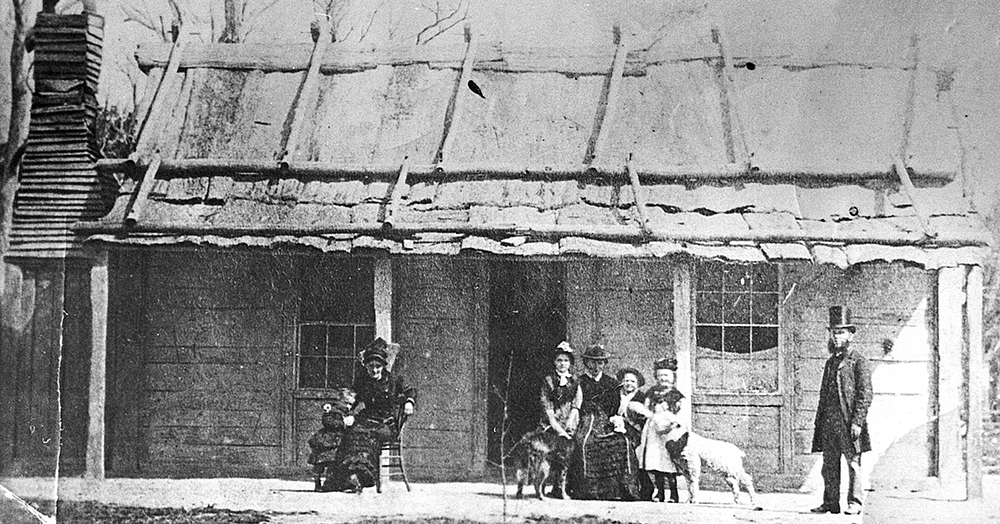
Ellen Kelly Interview
Visit Of The 1881 Royal Commission On The Police Force
In Victoria To Mrs Kelly, 14 May 1881
Source: The Argus, 16 May 1881, page 16
Not included in the Commission’s Official Report
On Saturday morning the commission went by road from Benalla to Glenrowan, passing through Greta. En route a short stay was made at the residence of Mrs. Kelly, mother of the late outlaws, Ned and Dan Kelly. Her residence, a four-roomed slab hut, with a bark roof, stands in the middle of a paddock comprising about forty acres. It is within a short distance from a mountain, called Quarry-hill, whence a good view of the surrounding country can be obtained.
Within the paddock there were two or three horses and as many cows, and there were a few fowls and a tame kangaroo about the house. But the place presented a gloomy, desolate appearance. There was a very small kitchen garden, but there was no other land under cultivation. Some of the panes of glass in the windows were broken, and, excepting that some creepers had very recently been planted at the foot of the verandah posts, no atempt had been made to beautify the house, or make this home look homely.
When the commission pulled up on the road opposite the front door that door was closed, and there was no sign of any human being about. Presently, however, a child was observed peeping round the back of the house at the strangers. After a short consultation, it was decided that it would be better for the commission, as they were near the house, to ask Mrs. Kelly if she had any statement to make on the subjects that they have been appointed to inquire into.
Accordingly, Messrs. Graves and Anderson were told-off to go to the house, and open up communication with Mrs. Kelly. She came round from the back of the house to meet them, and intimated, when she was told of the object of the visit, that she had no objection to see the commission. The remaining members were then called up, and introduced by Mr. Graves to Mrs. Kelly. She was dressed in black, and seemed to be between 40 and 45 years of age. In her younger days she was probably comely, and her hair is still abundant, and black as a raven’s wing. Although looking careworn, she has evidently a large stock of vitality. Her eyes and mouth are the worst features in her face, the former having a restless and furtive, and the latter a rather cruel look.
When Mr. Graves introduced the other commissioners, Mrs. Kelly said with a smile, ‘I didn’t know who you could all be; I thought it was a circus.’ … after a short and rather uncomfortable pause, Mr. Longmore undeceived Mrs. Kelly by informing her that they were the Police Commission, and would be glad to listen to anything she had to say. She did not invite the commisioners into her house, or open the front door; and two or three very young children, her offspring, could be seen inside the house, peering through a window. One of these children was a pretty little girl about four or five years old, and her face reminded one very forcibly of Ned Kelly, whose hair and eyes were of a different colour from his mother’s. Mrs. Kelly made the following statement:
The police have treated my children very badly. I have three very young ones, and had one only a fortnight old when I got into trouble (referring to her recent imprisonment in connexion with the assault on Constable Fitzpatrick at Greta). That child I took to Melbourne with me; but I left Kate and Grace and the younger children behind. The police used to treat them very ill. They used to take them out of bed at night, and make them walk before them. The police made the children go first when examining a house, so as to prevent the outlaws, if in the house, from suddenly shooting them. Kate is now only about 16 years old, and is still a mere child. She is older than Grace. Mrs. Skillion is married, and, of course, knew more than the others, who are mere children. She is not in the house now. Mr. Brook Smith was the worst behaved of the force, and had less sense than any of them. He used to throw things out of the house, and he came in once to the lock-up staggering drunk. I did not like his conduct. That was at Benalla.
I wonder they allowed a man to behave as he did to an unfortunate woman. He wanted me to say things that were not true. My holding comprises 88 acres, but it is not all fenced in. The Crown will not give me a title. If they did I could sell at once and leave this locality. I was entitled to a lease a long time ago, but they are keeping it back. Perhaps, if I had a lease, I might stay for a while, if they would let me alone. I want to live quietly. The police keep coming backwards and forwards, and saying there are ‘reports, reports.’ As to the papers, there was nothing but lies in them from the beginning. I would sooner be closer to a school, on account of my children. If I had anything forward I would soon go away from here.
Upon being asked whether any of her children had any complaint to make, Mrs. Kelly knocked at the front door, and called out to her daughter Grace to open it. Grace did so, and after much persuasion on the part of her mother, came to the open door, but speedily retreated behind it. She seems about 14 or 15 years old, and bears a much greater resemblance to her brother ned than either Mrs. Skillion or Miss Kate Kelly do. Most of the party, seeing that the girl was bashful, withdrew from the house, and then Grace made a statement to Mr. Longmore and one or two others to the effect that one of her brother Ned’s last requests was that his sisters should make full statements as to how the police had treated them. She then continued as follows:
On one occasion Detective Ward threatened to shoot me if I did not tell him where my brothers were, and he pulled out his revolver. The police used to come here and pull the things about. Mr. Brook Smith was one of them. He used to chuck our milk, flour, and honey, on the floor. Once they pulled us in our night clothes out of bed. Sergeant Steele was one of that party.
Mrs. Kelly further stated that when she ‘came out’ her children’s clothes were rotten, because of their having been thrown out of doors by the police. The police, also, had destroyed a clock and a lot of pictures, and had threatened to pull down the house over their heads. She was understood to make a statement to the effect that the police had made improper overtures to some of her daughters, but she afterwards said that she had no such charge to make.
